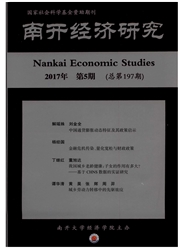

 中文摘要:
中文摘要:
本文利用2004--2011年中国的省际面板数据从强度和时间特征两个维度就房价波动对我国城镇居民消费行为的影响效果进行了实证检验。研究结果表明:虽然从总量上看房价上升对居民消费表现为财富效应,但在这背后存在着显著的结构性差异。从对不同收入阶层的影响来看:房价上升主要是通过预防性储蓄渠道和流动性约束渠道促进了中等、中等偏上收入阶层短期消费的增加,而对高收入阶层的消费并没有表现出明显的财富效应,并且过高的房价还对低收入阶层的消费产生了持续的挤出效应。从对不同消费类别的影响来看:住房消费所带来的派生效应并不显著,房价上升主要是促进了大额耐用消费品消费和文教娱乐等“享受型”消费支出的增加,而对食品、衣着和医疗保健等“生存型”消费支出却表现出持续的抑制作用。
 英文摘要:
英文摘要:
The dissertation uses dynamic panel regression model to exam the impact of house price fluctuation on urban residents' consumer behavior from two dimensions of in- tensity and time characteristics. The result shows the rise of house price has a positive effect on urban residents' total consumption but discovers the great differences of impacts between different income groups and consumption categories. First, the rise of house price will mainly promote the current consumption of middle-income and upper-middle-income households, but significantly inhibit the consumption of low-income households in the long time, and for high-income households there is no statistical positive relationship between changes in house prices and consumer spending. Second, the rise of house prices will mainly promote consumer speding on transport and communications, as well as education and recreation, but inhibit consumer speding on food, clothing and medician.
 同期刊论文项目
同期刊论文项目
 同项目期刊论文
同项目期刊论文
 期刊信息
期刊信息
